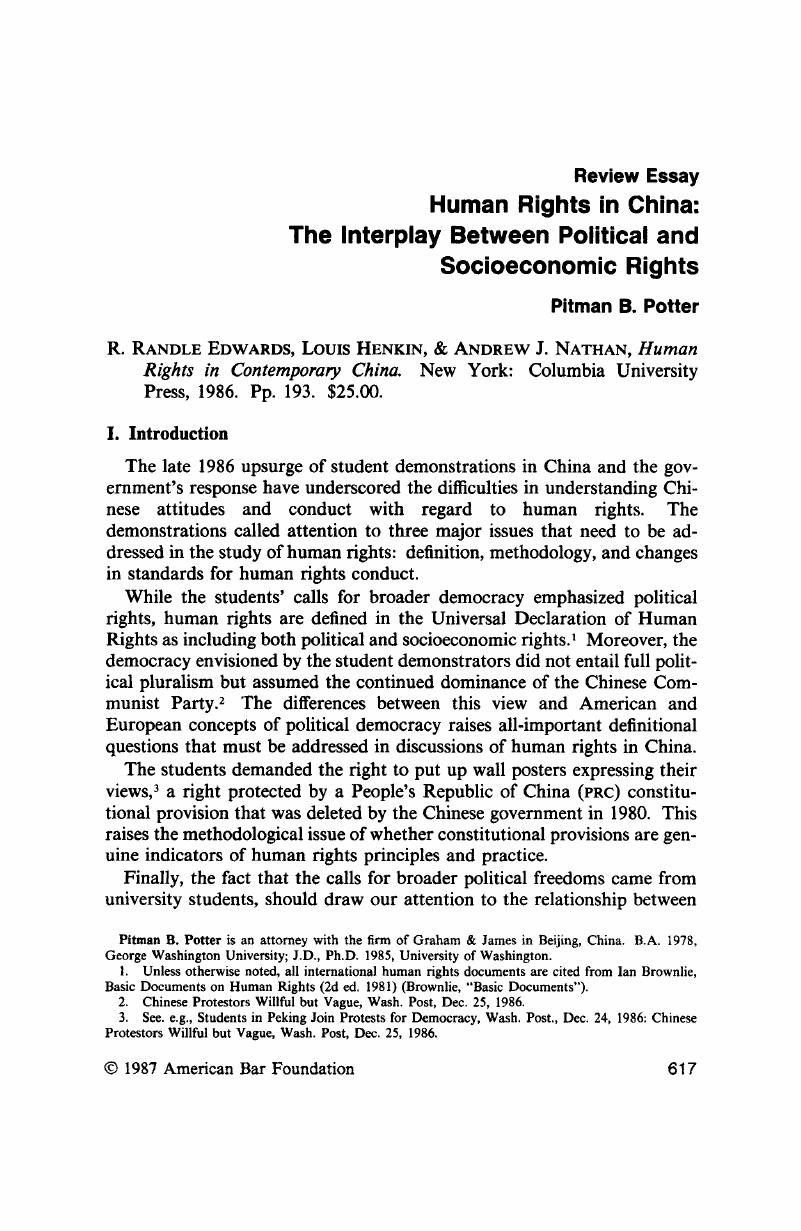No CrossRef data available.
Article contents
Human Rights in China: The Interplay Between Political and Socioeconomic Rights
Published online by Cambridge University Press: 20 November 2018
Abstract

- Type
- Review Essay
- Information
- American Bar Foundation Research Journal , Volume 12 , Issue 2-3 , Spring-Summer 1987 , pp. 617 - 626
- Copyright
- Copyright © American Bar Foundation, 1987
References
1 Unless otherwise noted, all international human rights documents are cited from Ian Brownlie, Basic Documents on Human Rights (2d ed. 1981) (Brownlie, “Basic Documents”).Google Scholar
2 Chinese Protestors Willful but Vague, Wash. Post, Dec. 25, 1986.Google Scholar
3 See. e.g., Students in Peking Join Protests for Democracy, Wash. Post., Dec. 24, 1986: Chinese Protestors Willful but Vague, Wash. Post, Dec. 25, 1986.Google Scholar
4 This dichotomy is set forth in the Universal Declaration of Human Rights. See Brownlie, Basic Documents. Henkin, Edwards, and Nathan each allude to this dichotomy in their contributions to the volume.Google Scholar
5 For one recent series of discussion, see Symposium: Human Rights, 13 Den. J. Int'l L. & Pol'y 155 (1985). Also see Symposium on the Future of Human Rights in the World Legal Order, 9 Hofstra L. Rev. 337 (1981).Google Scholar
6 This is similar to the approach taken by Seymour, James D., China Rights Annals 1 (1985). Also see Bulletin of the Society for the Protection of East Asians' Human Rights, edited by Professor Seymour, which provides regular reporting on Chinese human rights practice.Google Scholar
7 See, e.g., Hungdah Chiu & Shao-chuan Leng, Criminal Justice in Post-Mao China (1985); Amnesty International, China: Violations of Human Rights (1984); Amnesty International, Political Imprisonment in the People's Republic of China (1978). Also see Mitchell A. Silk, The Crime of Dissent in China, Probs. Communism, July-Aug. 1985, at 61.Google Scholar
8 See, e.g. Meron, T., On a Hierarchy of International Human Rights, 80 Am. J. In'tl L. 1 (1980).Google Scholar
9 Myres S. McDougal, Harold D. Lasswell, & Lung-chu Chen, Human Rights and World Public Order (New Haven, Conn.: Yale University Press, 1980).Google Scholar
10 Brownlie, Basic Documents at 26–27.Google Scholar
11 Arts. 2, 30, Brownlie, Basic Documents at 22, 27.Google Scholar
12 Constitution of People's Republic of China art. 51 (Beijing: Foreign Languages Press, 1982).Google Scholar
13 For broader discussion along the lines of Henkin's analysis, see Roberto Mangabeira Unger, Law in Modern Society (1976).Google Scholar
14 Louis Hartz, The Liberal Tradition in America: An Interpretation of American Political Thought Since the Revolution (1955). For a discussion of the difficulties of applying these values to developing countries, see Robert A. Packenham, Liberal America and the Third World (1973).Google Scholar
15 Also see Nathan's essay on Chinese constitutions (at 121).Google Scholar
16 This dichotomy was addressed (albeit not explicitly) as early as 1967 by Lubman, Stanley in Mao and Mediation: Politics and Dispute Resolution in Communist China, 55 Cal. L. Rev. 1284 (1967). Also see Li, Victor H., Law Without Lawyers (1977).CrossRefGoogle Scholar
17 See generally John Rawls, A Theory of Justice 60–90 (1971); Unger, Law in Modern Society at 203–16.Google Scholar
18 The Criminal Procedure Law (1979) and the Civil Procedure Law (1982) are manifestations of this new concern.Google Scholar
19 PRC Constitution arts. 1, 33.Google Scholar
20 These points are discussed in Nathan's essay, Political Rights in Chinese Constitutions.Google Scholar
21 See, e.g., Womack, Brantly, Modernization and Democratic Reform in China, 18 J. Asian Stud. 417 (1984).CrossRefGoogle Scholar
22 In addition to Max Weber's classic study of the role of law in Economy and Society (Roth & Wittich eds. 1978), see generally Harold J. Berman, Law and Revolution: The Formation of the Western Legal Tradition (1983). Also see Robert Tigar & Marion Levy, Law and the Rise of Capitalism (1978).Google Scholar
23 Report on Enlarged Meeting of the CCP Central Committee Politburo, People's Daily, Jan. 17, 1987 (overseas ed.). Speeches by Chinese central-level political leaders, published in concert with the celebration of the July 1, 1987, anniversary of the founding to the Chinese Communist Party, indicated that the “antibourgeois liberalization” campaign had begun to weaken. See, e.g., Deng Xiaoping, Reform of the Leadership Systems of the Party and the State (delivered Aug. 18, 1980), People's Daily, July 1, 1987, at 1; Zhao Ziyang, Speech at a Meeting of Propaganda, Theory, Journalism, and Party School Cadres (delivered May 13, 1987), People's Daily, July 2, 1987, at 1.Google Scholar




